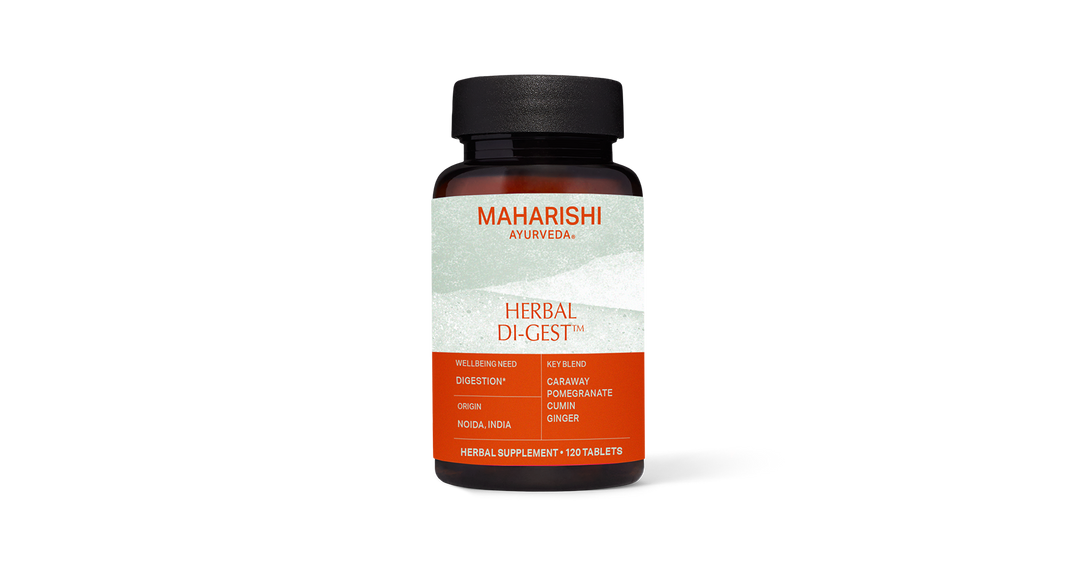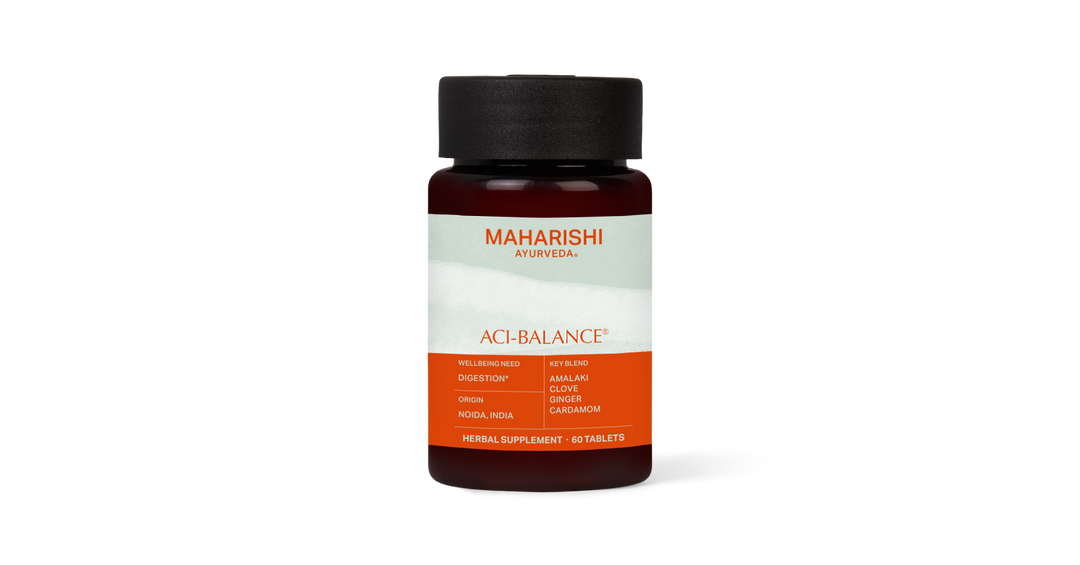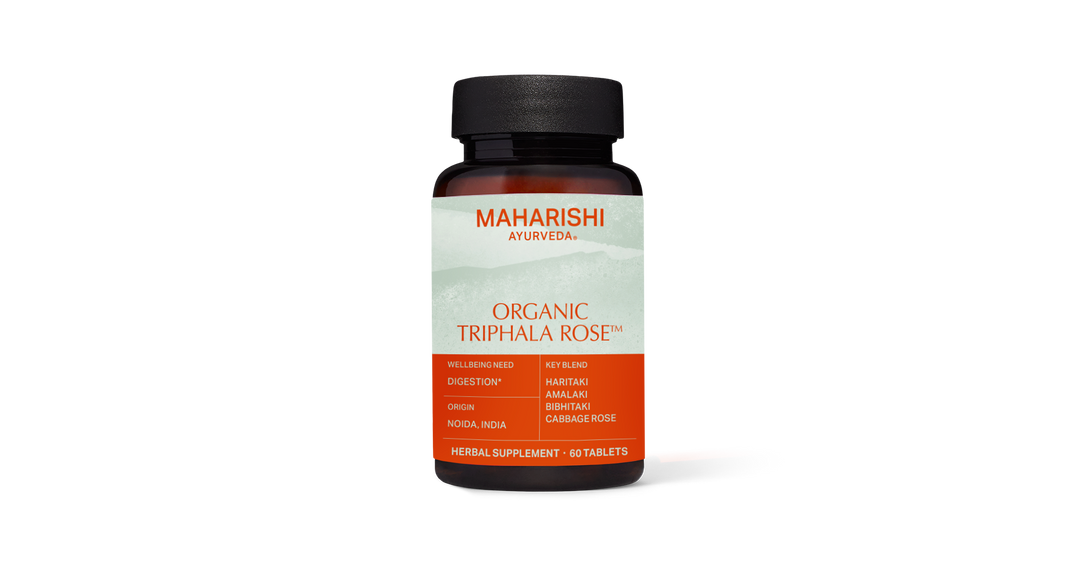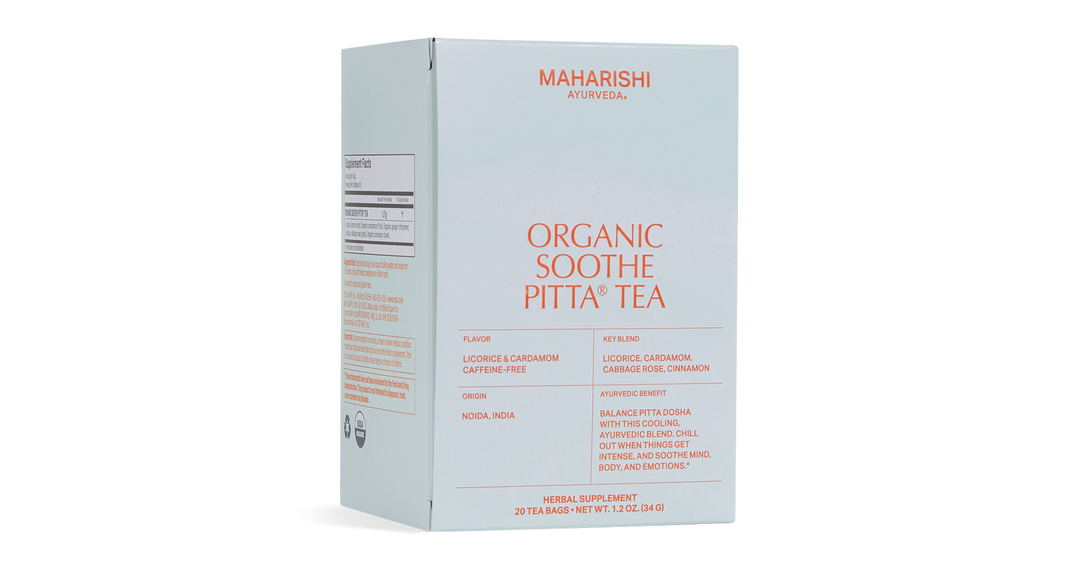We’ve all been there—burping, feeling gassy, and clutching your stomach because you ate something too rich, heavy, or spicy right before bed. Acid indigestion happens to just about everyone now and then. From the perspective of Ayurveda, a sour stomach can be caused by a number of different factors, and some of them might surprise you.
Causes of occasional acid indigestion according to Ayurveda
Some of the more commonly recognized culprits for an upset stomach include overeating, emotional eating, consuming foods that don’t agree with you, and grabbing meals and snacks on the go. From an Ayurvedic standpoint, occasional acid stomach can also be caused by an imbalance in Pitta dosha.
Ayurveda teaches us that everything in the world is made up of three different elemental energies, or doshas: Vata (air/space), Pitta (fire/water), and Kapha (earth/water). The three doshas are reflected in every facet of nature’s rhythms, from the seasons and the weather to the time of day. Because we are part of nature and vice versa, the three doshas are reflected in our minds and bodies as well. Vata dosha governs all movement in your body, including elimination, breathing, and blood flow. Pitta dosha governs your body’s metabolic processes, including digestion. And Kapha dosha governs your body’s bones, tissues, muscles, and overall structure.
When you eat a meal, Pitta dosha fires up so you can digest and metabolize your food. But when you eat things that are overly spicy, sour, or acidic, it can increase Pitta in your stomach, leading to hyperacidity down the road. Other things that can increase Pitta dosha in the digestion include hot climates, warm weather, and eating when you are angry or upset. People with a natural abundance of Pitta dosha in their constitution (Pitta mind-body types) may also experience acid stomach more than other dosha types. (Not sure what your dosha type is? Take our free Dosha Quiz and get customized recommendations for nutrition, herbs, and lifestyle tools.)
Over-the-counter antacids can ease discomfort in the moment by masking symptoms, but may cause a rebound effect later on. So what to do? As with most things in Ayurveda, taking measures ahead of time to minimize potential acid indigestion is the first step.
How to avoid indigestion
Sometimes, no matter what you do, indigestion happens! When it’s an issue for you, here are some foods and activities you may want to avoid.
Foods to avoid when you have occasional indigestion
By nature, Pitta dosha is hot, sharp, oily, fluid, and intense. Ayurveda teaches us that like increases like and opposites balance, so if you want to decrease Pitta qualities in your mind and body, it’s beneficial to reduce or avoid foods that have those properties, including:
- Hot or warm foods
- Spicy foods like chili, hot peppers, chile peppers, hot sauce, and black pepper
- Sour foods like tomatoes, yogurt, citrus fruit (oranges, lemons, pineapples), sour cherries
- Salty foods like potato chips
- Greasy, oily, or deep-fried foods like French fries and onion rings
- Fermented foods like sauerkraut and soy sauce)
- Caffeinated beverages and foods like coffee, black tea, and chocolate
- Alcoholic beverages like wine, beer, and cocktails
It’s also good to avoid skipping meals if you’re a Pitta mind-body type, or simply experiencing an overabundance of Pitta. Skipping meals can throw your digestion off balance and leave you “hangry” and irritable (and also more susceptible to occasional acid stomach).
Foods to favor when you have occasional indigestion
Foods that decrease Pitta dosha in the mind and body are those that are cooling, sweet, and soothing. Some examples include:
- Cool or room-temperature foods (but ice-cold foods and beverages are not recommended, as they can dampen your agni (digestive fire)
- Sweet foods like rice, milk (organic is best), cucumbers, squash, zucchini, fennel, sweet potatoes, and sweet juicy fruits (like ripe pears and mangoes). Melons like watermelon and honeydew are wonderfully hydrating and Pitta-balancing, but Ayurveda recommends eating them on their own, as they are incompatible with most foods.
- Healthy fats like ghee (clarified butter), coconut oil, and olive oil are good for Pitta in moderation
- Bitter foods like leafy greens (chard, kale, and collards) and artichokes
- Hydrating beverages like pure water and coconut water
Learn more about the Pitta-balancing diet.
Lifestyle changes to help you avoid indigestion
In addition to favoring Pitta-balancing foods and drinks, these Pitta-balancing lifestyle tips can be helpful:
- Stay hydrated - Drink plenty of room-temperature water and fluids throughout the day. Coconut water is especially hydrating and cooling when you’re feeling an overabundance of Pitta dosha in your mind and body. Drinking room-temperature Organic Soothe Pitta Tea is another great choice. This cooling beverage is made from a delicious combination of licorice, cardamon, cabbage rose, and other botanicals.
- Eat three meals a day - Avoid skipping meals when you’re feeling overheated. Instead, try to eat three meals per day, at the same time each day. Favor foods that are cooling and Pitta balancing. Read more tips on balancing Pitta through diet and lifestyle.
- Try digestion-boosting Ayurvedic herbs - Certain Ayurvedic herbs and formulas can help you to digest and assimilate your food better:
- Try Herbal Di-Gest a wonderfully balancing formula that supports improved digestion and helps stave off unpleasant issues like occasional gas and belching.
- A soothing blend of synergistic herbs and spices like cabbage rose, amla, and Indian jalap, Aci-Balance offers fast-acting comfort for occasional heartburn while also addressing deeper digestion imbalances.
- Need a daily detox for your digestion? Organic Triphala Rose is an age-old Ayurvedic formula that encourages regular elimination and better assimilation of nutrients. It also helps to balance the microbiome.
- Eat in a calm, settled environment - As simple as it sounds, eating in a quiet, calm environment is very beneficial for your digestion. Avoid working or discussing intense topics while you’re eating, as stress can lead to indigestion. Give your attention to your meal and engage in easy, pleasant conversation; try to avoid reading or looking at screens (like your smartphone, TV, or computer). Avoid eating on the go.
- Avoid lying down with a full stomach - Eating a large snack or meal before bedtime can cause indigestion and the production of ama (toxins associated with undigested food). Try to favor lighter fare in the evening, like soups and stews, and avoid eating for a few hours before turning in. If you’re hungry right before bed, have a glass of warm milk (or non-dairy milk) with nutmeg for a little nourishment that won’t weigh you down.
- Take time to unwind - All work and no play can leave you feeling exhausted and depleted. Make time each day to recharge your batteries through calming activities like walking in nature, journaling, meditating, and doing yoga. Word to the wise, though: avoid hot yoga, which can aggravate Pitta dosha. Instead, favor calming Yoga Asanas and yoga poses that balance digestion.
Ayurveda offers a wealth of easy ways to help with occasional acid indigestion. And for more helpful tips on boosting your digestion and assimilation naturally, be sure to visit our Digestion Wellness Hub.






